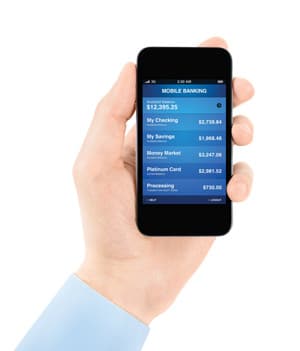Depositors at some of the largest U.S. banks are finally going to get the chance to do something quick and simple: send money to another person’s account instantaneously by mobile phone.
The idea has been in the works for at least five years, and in the meantime, Silicon Valley has made incursions into the industry’s role as a payment intermediary. But now, big banks including JPMorgan Chase & Co., Bank of America Corp., Wells Fargo & Co. and U.S. Bancorp are starting to plug into a system they jointly own, called clearXchange, that will allow each others’ customers to transfer money in a flash when they split a dinner check, rent payment or vacation bill.
“What we are doing now is delivering payments in real time, which is what our customers have asked for,” Mary Harman, managing director for payments at BofA, said in an interview. The bank is one of two that have started rolling out the system to customers.
While technology companies like PayPal Holdings and Facebook Inc. already offer snazzy payment apps that appeal to young consumers, the banking industry has a crucial advantage because it controls how quickly money actually moves between bank accounts. Individuals transferred some $200 billion to one another using mobile phones and computers last year, according to Javelin Strategy & Research.
Bank executives and analysts who closely track payment systems say that if clearXchange is fast, functional and user-friendly, banks can make up for lost ground.
BofA plans to announce on Wednesday that its customers can transfer funds instantly through clearXchange with customers of U.S. Bancorp, which said last week that it was plugged into the speediest part of the network. JPMorgan Chase & Co. and Capital One Financial Corp. representatives told Reuters they plan to offer the service later this year.
Analysts expect Wells Fargo & Co. and PNC Financial Services Group Inc. to do the same. Their representatives declined to comment.
Those six banks are among the seven largest by deposits in the United States. Regional bank BB&T Corp. is also one of the seven owners of the network, but is not ready to announce its plans, a spokesman said.
Citigroup, which has the fourth most U.S. deposits, has not joined clearXchange. A spokeswoman declined to say why. Citigroup uses an older network called Popmoney, which is owned by Fiserv Inc., for person-to-person payments.
Viral Nature
Venmo, which launched in 2012, handled $7.5 billion of person-to-person payments last year. In January, the company moved $1 billion between individuals – up tenfold in two years, said Bill Ready, PayPal’s global head of product and engineering, who brought Venmo to PayPal as part of a 2013 deal.
Those figures track well below the $22 billion of cash swapped digitally by BofA customers last year, or the $20 billion Chase QuickPay handled. But Venmo is growing rapidly, and its popularity has come almost entirely by word of mouth, as friends ask friends to sign up, said Ready. Facebook’s Messenger app offers a similar service.
While these apps send immediate alerts that money is on the way, they still rely on banks to make sure cash is available and move it. And, unlike banks, they have no control over the speed at which that occurs.
“As a Bank of America customer, when I hit send, a couple of seconds later the U.S. Bank customer will see the money in their account,” said BofA’s Harman.
Even so, Ready, the senior PayPal executive, said he is skeptical clearXchange will be a success. “The banks have a hard time working with one another,” he said, adding that it would be difficult for them to “recreate the viral nature of Venmo.”
Facebook representatives declined to comment on the banks’ plan, but said the company is continuing to improve Messenger’s payment functions.
The banking industry’s advantage could be short-lived, though. The network that Venmo and others often use to transfer funds will begin phasing in daily settlement in September. That network, called the Automated Clearing House Network, is a not-for-profit association whose members are financial firms.
“If Venmo becomes real-time,” said Javelin’s Moeser, “then the banks have no differentiator anymore.”
Banks that are part of clearXchange realize they must overcome the buzz and momentum that existing apps have gathered. They are working to come up with a catchier name than clearXchange, and hope to launch a marketing campaign around the middle of this year, said Harman.
“The important thing,” she said, “is that we are acting now.”






